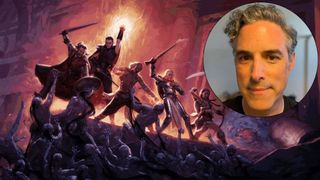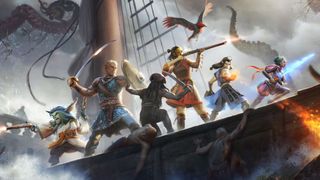Josh Sawyer: 'The most compromised games I worked on were Pillars of Eternity 1 and 2'
Though he's still proud of them, Pillars of Eternity's game director would have liked them to be different.

At GDC this year, PC Gamer hosted a roundtable in which a group of veteran RPG designers came together to discuss topics ranging from whether the cinematic BioWare-style RPG is dead to the impact of Elden Ring's success. When the conversation came around to the subject of how much their games were based on what the RPG audience was looking for, versus their own personal taste, Obsidian's design director Josh Sawyer—whose design credits include Fallout: New Vegas, Pentiment, Alpha Protocol, and plenty more—went all the way back to the beginning of his career.
"I've been playing D&D since 1985," Sawyer said, "and other tabletop roleplaying games along the way. When I got into the industry in 1999 the first game that I got to work on was Icewind Dale, and so I was like, 'Yeah!' I was so stoked." He describes working on Icewind Dale and its sequel, official D&D adaptations made in the Infinity Engine just like Baldur's Gate had been before them, as an opportunity to "dump" into videogames every idea he had about D&D while playing it around a table.
Years later, he returned to that kind of top-down, party-based, real-time-with-pause CRPG with Pillars of Eternity, which raised a record-breaking $3,986,929 on Kickstarter in 2012. But he returned a different man, with different ideas about how to design an RPG.
"Honestly, I have to say it felt like the most compromised games I worked on were Pillars of Eternity 1 and 2," Sawyer said. "Because when I came back to that format, I was like, 'Oh, I worked on these two [Icewind Dale] games, and then I worked on Neverwinter Nights 2, and now I have a bunch of new ideas for how differently I would do it if I were doing it on my own.' But they were crowdfunded games and the audience was like, 'No, we want D&D, we want exactly the same experience as the Infinity Engine games.'"
The fact that backers had already paid for an RPG that, in the words of that first Kickstarter, "pays homage to the great Infinity Engine games of years past", meant Sawyer felt he had to keep Pillars of Eternity retro even in places where he had better ideas. "I did feel a sense of obligation," he said, "but also I felt like I was making bad design decisions ultimately, like I was making a game worse to appeal to the sensibilities of the audience that wanted something ultra nostalgic."
That said, Sawyer doesn't consider the Pillars of Eternity games as they ended up to be failures, even if they are held back by their format rather than being "an evolution" of it. "It was a very weird experience, but I'm still proud of the games," he said.

Our RPG roundtable also included Mike Laidlaw, Strix Beltran, Lis Moberly, and Paweł Sasko. You can read more of the things they talked about, as well as listen to the whole 80-minute conversation right here.
The biggest gaming news, reviews and hardware deals
Keep up to date with the most important stories and the best deals, as picked by the PC Gamer team.

Jody's first computer was a Commodore 64, so he remembers having to use a code wheel to play Pool of Radiance. A former music journalist who interviewed everyone from Giorgio Moroder to Trent Reznor, Jody also co-hosted Australia's first radio show about videogames, Zed Games. He's written for Rock Paper Shotgun, The Big Issue, GamesRadar, Zam, Glixel, Five Out of Ten Magazine, and Playboy.com, whose cheques with the bunny logo made for fun conversations at the bank. Jody's first article for PC Gamer was about the audio of Alien Isolation, published in 2015, and since then he's written about why Silent Hill belongs on PC, why Recettear: An Item Shop's Tale is the best fantasy shopkeeper tycoon game, and how weird Lost Ark can get. Jody edited PC Gamer Indie from 2017 to 2018, and he eventually lived up to his promise to play every Warhammer videogame.
Most Popular






